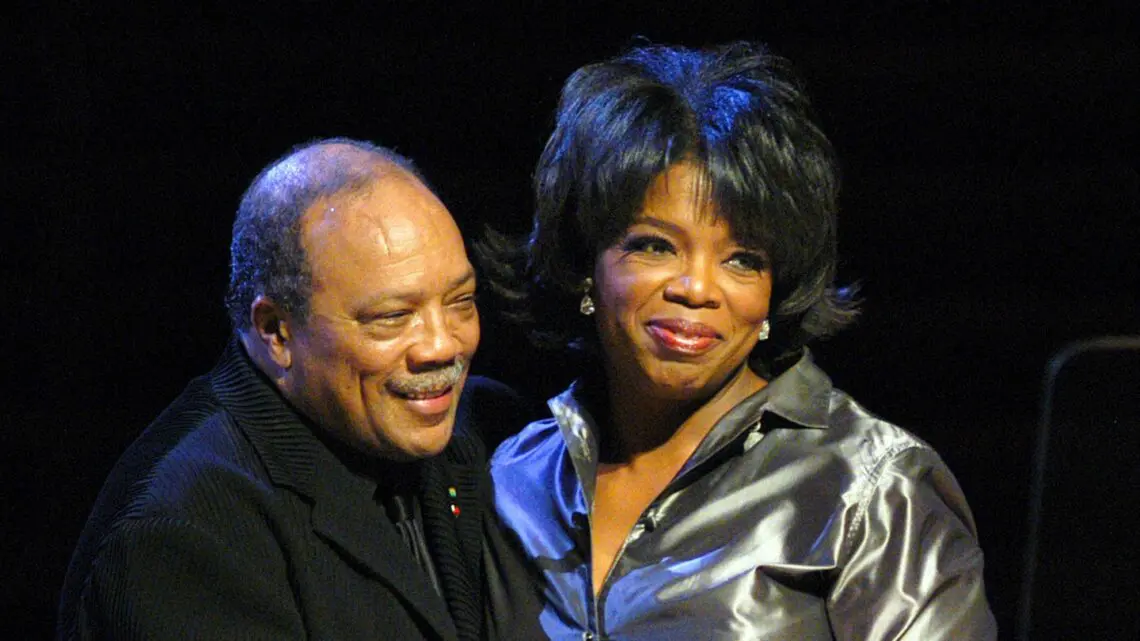The genius of Quincy Jones: Redefining music, film, and television
Quincy Jones stands as a towering figure in the world of entertainment, a multi-talented individual whose career spans the realms of music composition, film production, and TV show creation. His influence has not just propelled artists to stardom but has left an indelible mark on their lives. Explore the extraordinary journey of this maestro and how his unparalleled talent transformed the careers of some of the most iconic names in the industry.
Michael Jackson: From youth icon to global sensation
Before the legendary collaboration between Jones and Michael Jackson, Jackson was primarily known for his involvement with the Jackson 5 and his somewhat successful solo albums. The turning point came with their work on Off the Wall, a 1979 album that signified Jackson’s transition from a teen idol to a mature artist. This album, imbued with a sublime mix of disco, funk, and R&B, not only topped the charts but also earned Jackson his first Grammy, paving the way for the epochal Thriller.
Thriller wasn’t just an album; it was a cultural phenomenon. Featuring timeless classics such as “Beat It” and “Billie Jean,” it revolutionized the music industry and captured eight Grammy Awards in a single night, a record only recently matched. By fine-tuning every track to perfection, Jones helped Jackson craft what is still regarded as one of the best-selling albums in history.
We Are the World: A global harmony
The thought of bringing together Michael Jackson, Tina Turner, Bruce Springsteen, Diana Ross, and Bob Dylan on one track might sound impossible. Yet, Quincy Jones made this dream a reality with the monumental charity single We Are the World in 1985. Produced to raise funds for famine relief in Ethiopia, the anthem brought together a galaxy of stars and became one of the best-selling singles of all time.
Written by Michael Jackson and Lionel Richie, this song not only became an international anthem but also highlighted Jones’ unparalleled ability to bring together diverse musical talents for a noble cause. The song’s enduring legacy was recently revisited in an Emmy-nominated Netflix documentary, The Greatest Night In Pop.
Will and Oprah: The transformative touch
Jones’ genius wasn’t confined to music. His foray into film and television production also bore fruit, most notably in the careers of Oprah Winfrey and Will Smith.
Before her show gained national acclaim, Oprah found substantial success in The Color Purple, the first film produced by Jones. Oprah’s role as Sofia earned her Oscar and Golden Globe nominations, and she often credits Jones for changing her life. Oprah shares, “Working with Quincy changed everything for me. He has a big, open heart and treats everybody as if they’re the most important person he’s ever met.”
Will Smith, who had already won a Grammy for best rap performance, saw his career skyrocket through the TV series The Fresh Prince of Bel-Air, produced by Jones. Running from 1990 to 1996, the show established Smith as a household name. Smith acknowledges Jones as “the man who bet on me when I wasn’t even betting on myself.”
The greats: Collaborations that defined an era
Jones’ versatility shone through his collaborations with a multitude of musical legends. His early friendship and professional relationship with Ray Charles, which began in their teenage years, blossomed into chart-topping successes. Their joint endeavors, like the number one R&B hit “I’ll Be Good to You,” showcased their musical synergy.
Jones went on to work alongside icons such as Sarah Vaughan, Count Basie, Duke Ellington, Miles Davis, Dinah Washington, and Frank Sinatra. His ability to compose, arrange, and produce music across different genres and eras is a testament to his unmatched talent.
The scores: Cinematic excellence
Jones’ contributions to film scores are equally remarkable. Starting with The Pawnbroker in 1964, he scored nearly 40 films, including The Wiz, In Cold Blood, and In the Heat of the Night. His expertise extended to scoring TV themes for shows like Ironside, The Bill Cosby Show, and Sanford and Son. Even into the future, with upcoming projects like Lola (2024).
Awards galore: A legacy decorated with accolades
Before Beyoncé set the record for Grammy wins, Jones held an impressive 28 Grammy Awards. His first nomination came in 1961, and he won his first award in 1964. His accolades include album of the year for both Thriller and Back on the Block, record of the year for “We Are the World” and “Beat It,” and several others for his exceptional jazz compositions.
Jones’ Emmy win in 1977 for Roots and his Tony Award for the revival of The Color Purple in 2016 further cement his status as a multifaceted genius. His seven Oscar nominations, though never converted into a competitive win, earned him recognition, including the Jean Hersholt Humanitarian Award. Jones was the first Black artist to be nominated for best original song and best original score in the same year, showcasing his trailblazing legacy.
Quincy Jones is an icon whose contributions have reverberated across the decades, reshaping the trajectories of countless artists and defining new standards in the realm of entertainment. Discover more about this musical genius and his enduring influence by sharing this article on social media or following our updates for more intriguing stories.

 Italian
Italian







